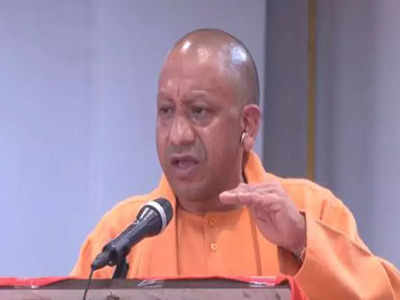GORAKHPUR: Uttar Pradesh Chief Minister Yogi Adityanath on Monday emphasised the profound connection between ayurveda, yoga and Nathpanth, and said all three share a common belief system centred around the importance of a healthy body for spiritual growth. He was addressing a special lecture on the second day of a three-day international seminar organised by the Guru Gorakhnath Institute of Medical Sciences (Ayurveda College) at Mahayogi Gorakhnath University’s Arogyadham.
Quoting the ancient Indian wisdom — “Sharir Madhyam Khalu Dharma Sadhanam” (the body is the medium for practising religion) — Adityanath said a healthy body is essential for performing spiritual, moral and worldly duties, ultimately leading to salvation.
He stressed that the principles of ayurveda, yoga and Nathpanth converge on the importance of maintaining a disciplined and healthy lifestyle for spiritual advancement.
“Ayurveda, yoga and Nathpanth — all emphasise discipline and self-control to maintain physical health. Ayurveda focuses on natural healing through medicines and Panchakarma treatments, while yoga promotes health through practices such as Hatha Yoga, Raja Yoga, Jnana Yoga, Laya Yoga and Kriya Yoga,” he said.
Nathpanth’s Hatha yogis combine yogic practices with “Khatkarma” techniques to strengthen the body, the chief minister added.
He highlighted that all three traditions share the belief that the body is composed of five elements (“Panchabhautik”).
Ayurveda views health issues as imbalances in “Vata”, “Pitta” and “Kapha”, and the Nath tradition also emphasises balancing these elements through self-discipline and yogic practices, Adityanath pointed out.
“Mahayogi Guru Gorakhnath emphasised that the universe resides within the human body and stated that the elements present in the universe also exist within us,” he said.
The chief minister elaborated on the teachings of the Nath tradition, emphasising the importance of “Niyam-Sanyam” (self-discipline) and adding that yoga has been instrumental in connecting individuals with these values.
He stressed that purification of the conscience can only be achieved through this and said the Nath yogis have provided a unique approach to this through functional yoga practices.
The Bharatiya Janata Party (BJP) leader explained that Nath yogis have detailed the benefits of specific yogic actions and mentioned that several prominent asanas, such as the Gorakh Asan, Matsyendra Asan and Gomukh Asan, have been named after them.
He further elaborated on the Nath tradition, where every Nath yogi wears a sacred thread that creates awareness about the body’s energy channels. The chief minister affirmed that yoga is an integral part of every Nath yogi’s life, fostering both physical wellness and spiritual discipline.
Discussing the teachings of Guru Gorakhnath, he emphasised the importance of exploring higher dimensions of consciousness.
Along with a conscious mind, Guru Gorakhnath also taught techniques to expand awareness beyond the conscious mind, helping yogis unlock the potential of the subconscious and unconscious mind through deep meditation and spiritual practices, Adityanath said.
He highlighted the resurgence of India’s ancient wisdom, saying that the country had once distanced itself from its rich heritage, leading to a period of cultural inferiority. The chief minister pointed out how ancient ayurvedic medicines were once patented by outsiders, stripping India of its intellectual legacy.
He credited Prime Minister Narendra Modi’s leadership with reviving global interest in ayurveda and yoga, with India reclaiming its rightful place as the origin of these sciences.
Adityanath also expressed pride in the growing global acceptance of ayurvedic treatments and yogic practices, emphasising how India’s ancient wisdom is once again being acknowledged and respected worldwide.
He explained that over various eras, sages and seers expanded and enriched this culture with their profound experiences and wisdom.
Initially, knowledge was transmitted orally through the “guru-shishya” (teacher-disciple) tradition. However, Maharishi Ved Vyas transformed this oral tradition into a written form by compiling knowledge in the form of four Samhitas, the chief minister said.
Maharishi Ved Vyas not only authored the four Vedas — Rigveda, Yajurveda, Samaveda and Atharvaveda — but also played a pivotal role in furthering Indian culture by composing the 18 Puranas, including the revered Shrimad Bhagwat Purana, he added.
Adityanath said “moksha” (liberation) is not merely the result of death but is achieved by reaching the peak of success through righteous living.
Indian wisdom does not confine religion to mere acts of worship, he asserted.
Instead, it defines religion in a broader sense, encompassing duty, virtue and moral values as a complete way of life, the chief minister said, adding that following a virtuous lifestyle and fulfilling one’s duties with integrity also constitute religious practice in the Sanatan tradition.
On the occasion, the chief minister released a souvenir of the seminar and two books written by K Ramachandra Reddy and Shantibhushan Handur.




